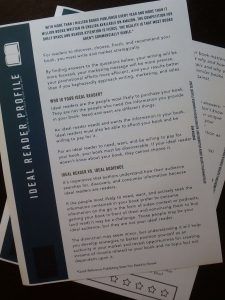
updated February 2021
This post will help you to define your ideal reader by asking you to identify your book’s highest level of contribution, who wants to hear what you have to say, and where those readers go to find the type of information your book provides.
The best time to do this is before you finish writing your book. If you plan to pitch your manuscript to a literary agent, this information must be part of your book proposal. The answers to these questions should guide your approach to writing your book and marketing material and building your author platform.
Ideal readers are the people most likely to purchase your book. They are not the people who need the information you provide in your book: Need and want are different things.
An ideal reader needs and wants the information in your book. Ideal readers must also be able to afford your book and be willing to pay for and then read it.
For an ideal reader to need, want, and be willing to pay for your book, your book must be discoverable. If your ideal reader doesn’t know about your book, they cannot choose it.
It’s imperative that authors understand how their audience searches for, discovers, and consumes information because ideal readers are readers.
If the people most likely to need, want, and actively seek the information contained in your book prefer to consume information on the go in the form of video content or podcasts, getting your book in front of them and convincing them to buy (and read) a book may be a challenge. Those people may be your ideal audience, but they are not your ideal reader.
The distinction may seem minor, but it's imperative that aspiring authors understand that competition for consumer attention is fierce and reading is only one way of consuming content (and often a less efficient way when compared to other options).
The 2020 Global50 Publishing Ranking analysts put it this way: "With an entirely new string of media companies taking hold of storytelling as the center of gravity for winning consumers' attention and time, the likes of Netflix, Amazon, and also Disney and Apple have become head-on competitors to trade publishing."
There is good news for authors who think strategically, however. Understanding where your ideal audience goes to consume content like yours will help you develop strategies to better position yourself in front of people interested in what you have to say and reveal opportunities for creating additional streams of income related to your book and its topic.
Identifying the benefits of your book is the first step on the path to developing a book marketing strategy and setting realistic book sales goals because it points to the people most likely to buy your book.
To do that, it’s helpful to ask a series of questions:
These are the types of people who care about what you have to say.
It's not enough to identify the benefits of your book. You must also identify why and how your book adds to the conversation about the topic and why a reader should choose your book over other similar books. For that, you must know who you're competing against.
When I ask this question, I typically get one of two answers: “I don’t know,” or “No one.” Neither is likely. If you don’t know your competition, you won’t be able to articulate your unique selling proposition (USP)—the thing that sets you and your book apart. If your ideal reader knows more about your competition than you do, you’ve compromised your position as an authority and a problem solver.
It's not enough to have a great book. If no one knows about it, no one will buy it.
So, how will your ideal reader find you?
By finding answers to the questions above, your marketing message will be more precise, your promotional efforts more efficient, and your results better than if you haphazardly approach writing, marketing, and sales.
 Do you want a downloadable pdf of my Ideal Reader Profile Worksheet?
Do you want a downloadable pdf of my Ideal Reader Profile Worksheet?If you'd like a pdf of my worksheet, feel free to email me a quick request. It's yours to have. I won't add you to an email list or anything.
Ready to talk to an experienced and results-oriented ghostwriter/book collaborator, book doctor, and developmental editor? To schedule a free, 30-minute consultation, click here.
Why You're Probably Writing Your Nonfiction Book Too Soon
Quick-Reference Publishing Stats You Need to Know!
Source:
Global50: The Ranking of the Publishing Industry 2020, pg. 10
Header photo by Jilbert Ebrahimi on Unsplash
